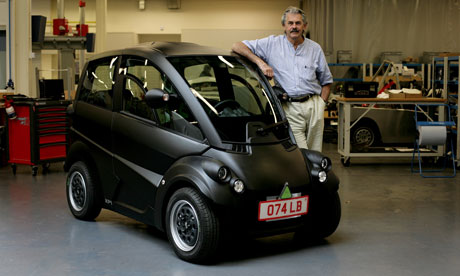No. Petrol cars are cheaper, so people will carry on buying cheaper petrol vehicles until they are no longer available. Early adopters will just suffer pain of ownership until petrol runs out, and everybody else is forced to buy something else. Assuming it's electric.
I didn't hear early CD buyers complaining.
£28.990 is not a reasonable price. In fact, it sucks. A car of similar performance could be had for less than a third of the price. That means it's got to make £20,000 of savings over it's life AND do everything the petrol car could do. Oh, sorry, it can't, 'cos it's got limited range, crap performance, and takes an age to recharge.
Lets see a Nissan Leaf will cost $32,780 here in the states, but you get a $7,500 federal rebate, so that is $25,280, then depending on the state you can get another $5,000 off, so that's $20,280 in the end.
Also lets check that performance you say is so bad. An equivalent to the Nissan Leaf is the Nissan Sentra ($16,270 to $20,830), the Sentra can do 0-60 mph in 7-9.5 sec depending on model, the Leaf can do 0-60 in 9 sec.
That maybe surprising for a 80 kw motor, compared to the 102-152 kw sentra engines could put out, but not surprising when considering the difference between electric motor and internal combustion engines. The leaf's motor puts out 233 Nm of torque, while the sentra engines can only put out 199-244 Nm at near max rpms. Electrics motors put out full torque at 0 rpm and maintain that torque roughly steady up to certain max rpm before degrading. ICE puts no torque at 0 rpm and has no steady torque profile, that why it needs multiple gear speed transmissions to try to average the torque and keep the rpms low as it accelerates, losing time in switching gears and grinding clutch. An electric car only needs one set gear and no clutch, its acceleration is constant and uninterrupted from 0-60.
As for range, the average driver only drives ~30 miles a day, 100 miles range will satisfy 98% of your driving needs, and if you need longer just get a PHEV. Considering charge times the Leaf can be rapidly charged at a charging station in 30 minutes. Slow charging has it advantages, you can charge at home, using off-peak power at night, assuming you do your daily commutes of less then 100 miles you will never need to see a gas station again! With the Leaf you will be paying less then 2 cents per mile, compared with 10 cents per mile minimum with the Sentra (at $3 per gallon, 34 mpg). Assuming 15000 miles per year that <$250 per year on the Leaf, >$1,324 with the Sentra. Considering the final price difference between the Leaf and Sentra (with all rebates) is -$550, you already made a profit from day one and will save $1074 per year on fueling. Add in that the Leaf has no motor oil, oil filter, fuel filters, clutch, spark plugs, fuel injector, air filters, etc, the maintenance costs will be much lower as well.
Hybrids aren't the solution either. OK around town, on short journeys, but over long journeys, on fast motorways, the benefits are lost.
Lets see a Civic Honda gets 36 mpg Highway and its hybrid gets 52 mpg Highway, something I'm missed? Its true that the planetary gear transmissions and CVT aren't as efficient as a good old manual transmission doing continuously 60 mph. A PHEV will easily do 50 mpg and higher considering the efficiency of its small generator at fix rpms, so its highway driving will be awesome.

